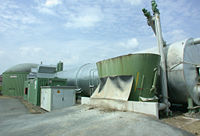
Photo from wikipedia
Abstract Disposal of organic fraction of municipal solid waste (OFMSW) at landfills and direct application of livestock manure onto soil are often restricted by regulations due to environmental concerns. These… Click to show full abstract
Abstract Disposal of organic fraction of municipal solid waste (OFMSW) at landfills and direct application of livestock manure onto soil are often restricted by regulations due to environmental concerns. These regulations require the application of different technologies, such as anaerobic digestion, in the management of OFMSW and livestock manure, and creates an opportunity for resource recovery. Since these waste sources are geographically dispersed, siting and sizing of resource recovery facilities to minimize transfer distances are critical for the sustainable management of these waste. This study aims to investigate the sizing, siting, and economic feasibility of municipality owned centralized biogas plants in the management of OFMSW and livestock manure through application of spatial modeling. A stepwise land suitability analysis was performed to determine potential plant sites followed by a location-allocation analysis to analyze siting, sizing and transportation costs for increasing number of plants. Finally, an economic assessment was conducted to compare unit cost of electric energy and existing feed-in tariff for biogas plants. The methodology was applied to the city of Izmir in Turkey. 8 biogas plants could be built in Izmir with a total installation size of 92 MWe and 10 $ cent/kWh unit cost of electric energy. This study represents an important step in the establishment of a local decision support system in Turkey for the utilization of regional bioenergy sources, and organic waste management.
Journal Title: Journal of Cleaner Production
Year Published: 2020
Link to full text (if available)
Share on Social Media: Sign Up to like & get
recommendations!